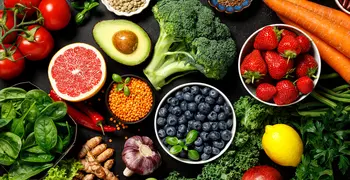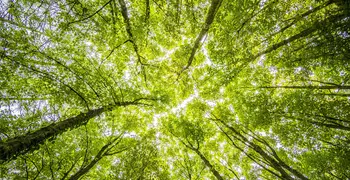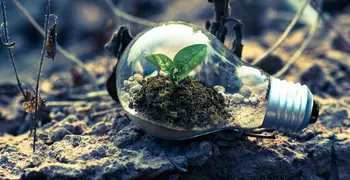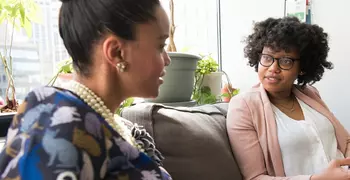Planetary Health for Students
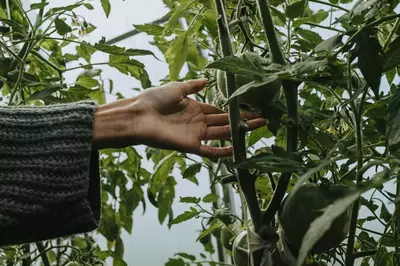
 Interview with Priscilla Trinh, she/her
Interview with Priscilla Trinh, she/her
CFANS 3rd year Sustainable Systems Management major, minors in food systems and management
Uprooted & Rising, Food Recovery Network
Part of an ongoing commitment to wellbeing includes looking outside yourself to understand the systems that create the world we live in. In recent decades, humans have become aware of the damage we are doing to the planet through overconsumption, corporate greed, and a fixation on productivity. Moreover, we are beginning to see the effects of this damage on our own wellbeing—whether that be through more frequent and severe natural disasters, widespread chronic illness, or growing social stratification. Experts across various disciplines are tracking the effects of human activity on the environment, revealing an urgent truth: The systems and norms that have carried us this far no longer serve us, and are in fact threatening our long-term goals of safety and security for the future of our planet.
The relationship between humans and the environment is mediated through many interconnected systems. Perhaps the most important of these is our food system, which drives food consumption as well as a large part of our economy. We had the opportunity to sit down with Priscilla Trinh, a University of Minnesota student at the College of Food, Agricultural, and Natural Resource Sciences, to discuss planetary health from a food-systems perspective.
CSH: So where should students start if they are interested in planetary health?
Priscilla: I think we need to start by developing the skills to take care of ourselves. And to take care of ourselves, first, we need to really reevaluate what is necessary. I think beyond food, water, shelter, air, clothing, social connection there’s not much else that we need. I’m passionate about food systems because how we take care of ourselves is how we interact with the earth, which has consequences. Growing food is a very integral part of surviving in our environment. For people who want to engage with planetary health on an individual basis, I think it begins by connecting back to their food and the land they live on.
So what can we do to sustain ourselves? Because right now we're very dependent on a monetary system that is inequitable. So, what are you going to do once things like that become less relevant? Especially in the face of a lot of planetary ecological crises. California’s wildfires have an impact on agricultural fields, which has impacted our supply chains. I think then is when communities really need to come together to support each other outside of monetary or political benefits.
When people start learning about planetary health and realize the magnitude of the climate crisis, it can feel overwhelming at times, to the point of preventing us from taking action. How do you address eco-paralysis?
 Thinking on a global scale can feel really draining. People can either gravitate towards denial, or on the other extreme, nihilism—thinking there is nothing left to be done and that we are completely screwed. But that is simply not true.
Thinking on a global scale can feel really draining. People can either gravitate towards denial, or on the other extreme, nihilism—thinking there is nothing left to be done and that we are completely screwed. But that is simply not true.
In my mind, I have this framing of deep time. Deep time is thinking about our existence in the grand scheme of things. Our universe is 13 billion years old; our planet, 4 billion, approximately. While it might seem imperative to take a lot of action this century for climate change reasons and for human health reasons, I think it’s important for people to step back and realize that we will survive this century just as we survived the last. Even though some actions are time-sensitive, I think that will take the load off of people in thinking about planetary health. We create so much pressure for ourselves thinking that everything has to be done now, and that’s very natural, but I think having this mindset can alleviate some of the more negative existential feelings.
Many Indigenous cultures talk about the seven generations framing: When you decide what you do now, keep in mind how that will affect the world seven generations from now. I think it’s important to learn from the past to guide our actions—especially thinking about humans and our role in the greater ecological system. We are, after all, just another species, and so while the world and things like planetary health may seem really complicated, it’s really driven by very few simple dynamics of energy and ecology.
Indigenous cultures seem to have a different philosophy when it comes to maintaining and caring for the land. How do you view our current agricultural system within the context of our country's history?
The system we have today is a product of colonialism. When we think of colonialism and history, it’s usually like, “Oh, someone took the land.” Well, the land is what you use to support yourself, so once you've lost your agency and ownership, it's about giving up power and control.
That’s what feeds into people feeling helpless—“We can’t take on a big corporation,” but think about it: They're all just made up of people. And so I think if we meet each other on a more human level and connect to our human needs, that would help people in facing these seemingly large obstacles.
 Where do you go to learn how to grow food?
Where do you go to learn how to grow food?
Personally, I work with the land and food on campus. On the St. Paul campus by the Bell Museum there is this Native American Medicine Garden. Since the resignation of Lakota steward, Cânté Sütá-Francis Bettelyoun, we’re figuring out a way to carry forth in a way that respects the Indigenous sovereignty of this stolen land. Adjacently, there's also the Nutritious U pantry garden that provides food for the UMN community. And I think, for people who want to learn about history and how to feed themselves and unlearn all these oppressive structures and systems that we work under, they could go to St. Paul campus and bond there and learn from other students, from faculty, from Indigenous community leaders. I’m also engaged in a research program at CFANS looking at how to grow carrots in static hydroponic systems which is essentially a bucket of standing water - it’s accessible which removes the daunting task of gardening.
I really encourage people to reach out to gardens and volunteer opportunities to get their hands dirty. Especially right now, we're all cooped up inside our houses with the pandemic but when you're outside, you could be by yourself and it's a very tangible way to slow down and learn. You can take these skills with you anywhere, whether or not you have a plot of land.
Activist burnout and eco-nihilism can thwart movements. How can people engage with these issues in an ongoing, sustainable way?
What I've always told people is, find other people to talk about these things, and be mindful of your bandwidth.
I know it's really tempting to join a bunch of boards or committees or groups, but just find your small group of people that you can talk about these things with and do things together. My involvement with Uprooted and Rising is fairly new, but we're trying to take on Aramark and Cargill, some of the largest privately owned companies in America. So just starting with a few of your friends and writing down what you believe and what you value, and then acting upon a couple of those values each year. You don't have to do everything immediately, and you should allow yourself time to grieve. If you don't, then I'd be a bit worried, who wouldn’t be sad in these times?
I think it's really inspiring and comforting to know that other people are in the same boat, and the more you talk about it the more normalized it becomes. Then once you've bonded over that, you realize that there's so much that's arbitrary about this world. You can do things with the people that you're friends with, it doesn't have to come from top-down. An alternative world is possible and there are so many communities and individuals working on it already.
Aside from the ongoing pursuit of learning and getting engaged, what kinds of daily practices can people adopt that support planetary health? What were some of the first steps you took when you started becoming aware?
 For me, I definitely took a hard look at my lifestyle. It's difficult; most of us live in cities or the suburbs and that does not lend itself to a minimalist lifestyle even if one wanted. But the first thing I did was eliminate single use conveniences from my life. Things like plastic utensils, I’ve replaced with a bamboo kit that I carry with me everywhere. Not every material is perfect, but I think investing in things like that that you can carry around that are reusable or compostable at least, really helps. Just looking at, what is something that you could invest in that you can reuse again and again, instead of throwing it away every time?
For me, I definitely took a hard look at my lifestyle. It's difficult; most of us live in cities or the suburbs and that does not lend itself to a minimalist lifestyle even if one wanted. But the first thing I did was eliminate single use conveniences from my life. Things like plastic utensils, I’ve replaced with a bamboo kit that I carry with me everywhere. Not every material is perfect, but I think investing in things like that that you can carry around that are reusable or compostable at least, really helps. Just looking at, what is something that you could invest in that you can reuse again and again, instead of throwing it away every time?
And then food, looking at, what do I eat? I started by eating less meat, and then paying attention to the produce I buy. A lot of people talk about eating local, and that's really good, but I think the misconception around local food is that it’s always better, which isn't true. So for example, if you eat a peach that's grown local, that might sound good but maybe it's better produced somewhere out east instead of the Midwest because of energetic and economical comparative advantages. So you're better off actually buying it from far away.
In addition to that I would say: Eat seasonally. This simply means buying and eating fruits and veggies that are currently in season, and holding off from those that aren't. So thinking about your needs versus your wants. Again, this is if you are not facing food security issues and have the means to eat like this. Food should not be a privilege but it currently is, unfortunately.
We may want strawberries and avocado in January, but what we buy and what we eat, that's like voting. Are you pushing for demand that stresses planetary health?
The supply chain will be there whether or not you eat it, but I think training yourself mentally and physically to go without these indulgences that might not always be there is better in the long run. I'm not trying to promote a scarcity or Doomsday mindset, but I think it's a recalibration of, “I want this, but what do I actually need? Can I live without it, and find better pleasures to substitute it with?” It’ll go a long way in reshaping expectations which can avoid disappointment or anti-climatic fulfillment.
What would you tell students who are just beginning to join the conversation on planetary health?
It's not about revolution overnight. That's what causes stress. It's a transition. A lot of people have guilt and that's why they're paralyzed because they feel like, “Everything I do is wrong. Everything I do has some negative consequences.” And it's not about being perfect. You can't spend your whole day thinking “I could be better.” But I really think it’s about looking into those little and big ways you can make a difference, and making those into habits that inform how you show up in the world.
In Fall 2020, the University of Minnesota's Bakken Center for Spirituality & Healing hosted the Wellbeing Series for Planetary Health, which featured Minnesota human health and climate change experts. View the videos to explore tips from our featured speakers, and learn more about how planetary health impacts your wellbeing.
Learn more about Student Wellbeing. Student Wellbeing provides resources specific to college students and their wellbeing, especially around issues like stress, mental health, addiction, financial obstacles, and other barriers that prevent them from thriving at university and in life.
